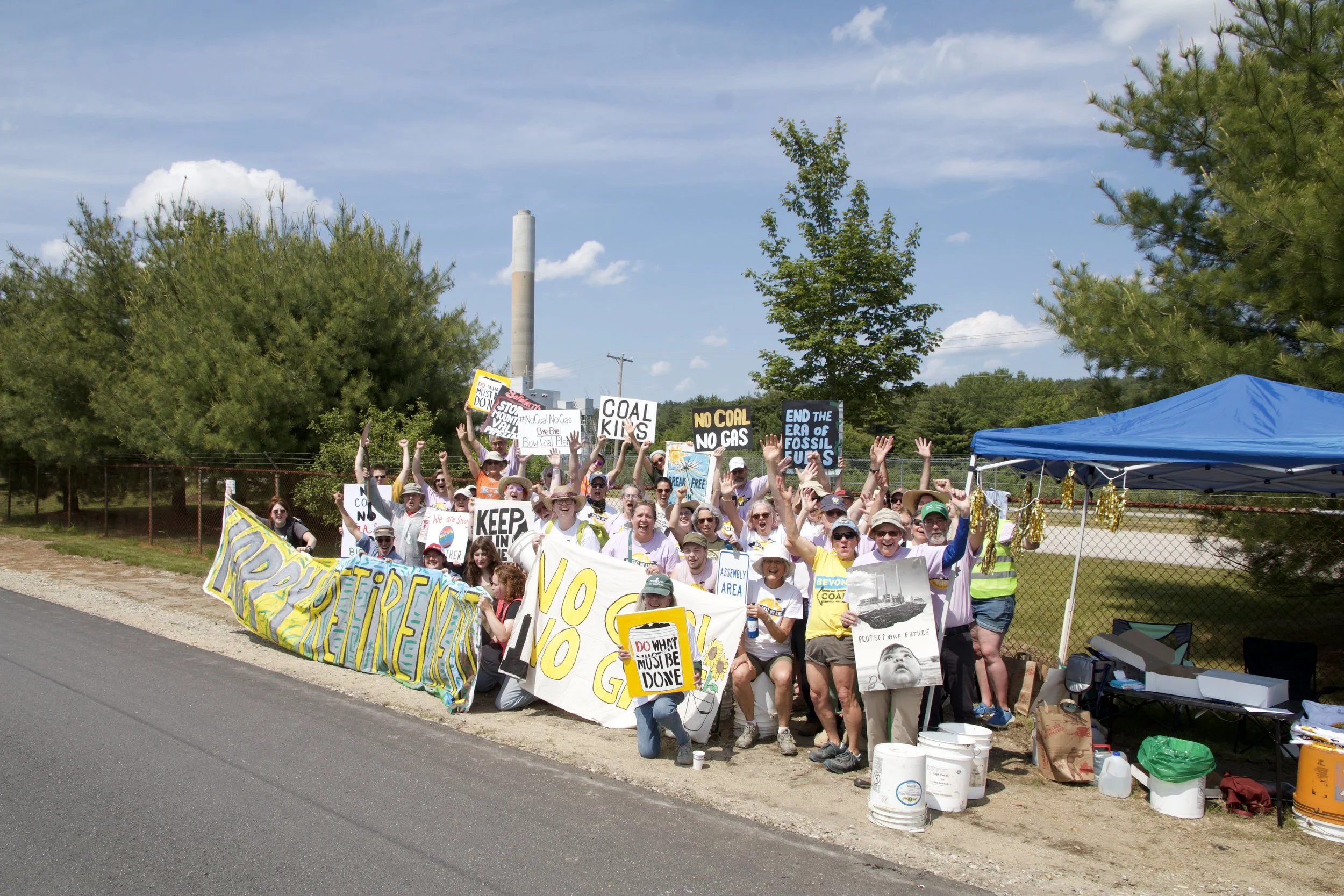Merrimack Station Ends Coal Operations Early, Clearing the Fuel from Regional Electric Grid
BOW, NH - Community organizing has defeated coal in New England. On September 12, almost six years to the day from activists’ first entrance to remove buckets of coal, Merrimack Station ceased burning coal. Plant owner Granite Shore Power previously announced a 2028 shutdown date, but has confirmed coal operations ended three years early.
The plant’s early closure affirms what activists with No Coal No Gas have long asserted: we do not need coal to power our electric grid. “In this moment of relief that Merrimack Station will no longer be polluting the air and waters in New England, it is also important to note that none of us will see any difference in the electricity available to our homes,” said Nastasia Lawton-Sticklor. “Plants like this one, owned by private equity, take more from us than they give. Now that coal is officially gone from New England, we continue our focus on building the clean, equitable energy system that we know is possible.”
As the last coal-burning plant in so-called New England, Merrimack Station had long been the particular target of activists including No Coal No Gas — a campaign which launched in 2019 with the three goals of building community, showing what’s possible, and shutting down coal at Merrimack Generating Station. Together with local Indigenous leaders, labor unions, youth organizers, environmental justice advocates, and lovers of the Merrimack River, No Coal No Gas has waged a six-year campaign. Activists blockaded coal trains, took direct action at the coal plant, challenged fossil fuel subsidies at grid operator ISO-New England, occupied the coal smokestack, and successfully won a shut down plan that includes a clean energy transition plan.
In March 2024, Granite Shore Power announced a tentative transition plan for Merrimack Station involving solar and battery storage. No Coal No Gas celebrated these announcements, both for increasing renewables on the electric grid and for stabilizing the transition for Merrimack Station employees. Hearing that some Merrimack Station workers have been fired is a bitter note to this sweet news. No Coal No Gas has reached out to our contacts at the IBEW local, and would love to hear from any union or non-union workers who lost their job or had to take a difficult transfer about support they need.
These layoffs and transfers seem to be recent, but Merrimack Station has been unable to operate regularly for years, particularly since failing an emissions test in February 2023. However, the plant still received $784,610 a month in subsidies through the Forward Capacity Auction [FCA] from June 2025 to the present month. The FCA, administered by regional grid operator ISO-New England, funds these subsidies through utility bills. Although ISO New England is currently redesigning the FCA process, it has not provided any meaningful opportunities for ratepayer input on the new process.
“ISO-NE has favored outdated fossil fuel plants for many years, when they could have been using that money to create the energy grid needed for this moment in history,” said Kendra Ford, an organizer with 350NH. “The transition to clean energy has the potential to create union jobs through the clean up of old peaker plants and installation of new projects. ISO-NE could focus on funding clean energy and innovative storage, reducing climate disaster, and saving us all money.”
Now, No Coal No Gas has its sights set on closing the region’s remaining fossil fuel peaker plants. Like Merrimack Station, these inefficient oil and gas facilities receive monthly ratepayer subsidies, but sit idle most of the year. When they are called to operate at times of high electricity demand, they do so with extra-high pollution at extra-high costs.
“There are other ways to manage peak demand besides simply flipping the switch on an oil plant,” said Kendra Ford. “We can all work with our neighbors to adjust our collective energy use, and push institutions and corporations to do the same. We can share space and appliances during the highest peaks and strategically shift timing of electricity use so peakers won’t run. When we talk about what collective demand reduction could look like (music at the library together, shared neighborhood meals, walks in the woods to see the sunset) people's eyes light up. Our campaign has always started with building community. And then we work to build power and show what's possible. That collective strength and resilience is how we shut fossil fuels down.”


